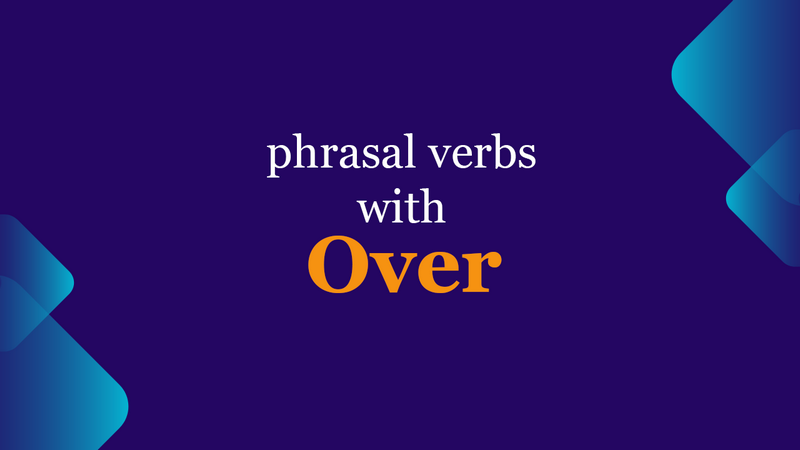If you want to rapidly improve your English vocabulary, start by learning all the uses of the word “over.” This simple preposition packs a punch when combined with verbs to form versatile phrasal verbs. Mastering “over” unlocks hundreds of new expressions instantly.
Let’s break down the main usages of “over” and see just how many new vocabulary words emerge.
💡At a Glance
| Phrasal Verb | Meaning | Example |
| come over | to visit someone | Can you come over later? |
| drive over | to travel to a place by car | I can drive over this weekend. |
| run over | to travel to a place by running | It might rain, so I’ll just run over. |
| think over | to consider something carefully | I need to think over my options. |
| talk over | to discuss something thoroughly | We talked over the issue yesterday. |
| talk over (food/drink) | to refer to eating/drinking while discussing something | That’s an interesting idea. Let’s talk more over lattes. |
| be over | to be finished or completed | I’m glad this project is finally over! |
| get over | to recover from something | It took me a month to get over my illness. |
| take over | to get control, to become the leader | She took over as manager last year. |
| read over | to read something again | I need to read over these instructions again. |
| do over | to repeat or redo | He’ll do over his painting for a better result. |
| overdo | to do something too much | I overdid the desserts and now have a stomachache. |
1. Movement
Combine “over” with a movement verb and you get phrasal verbs showing how that movement occurs.
- Can you come over? (come + over)
- I can’t just drive over. I don’t have a car. (drive + over)
- Then bike over. You have a bike. (bike + over)
- It’s raining, so I’ll run over instead. (run + over)
See how the phrasal verb changes depending on the method of transportation? You can bike over, walk over, or even dance over! The possibilities are endless.
2. Careful Consideration
“Over” can mean doing something carefully, with a lot of time and consideration.
- Don’t quit your job in anger. Sleep on it and think it over.
- We argued, but we talked it over and made it up.
Here the phrasal verb refers to the way you are carefully pondering the issue – by sleeping, talking, etc.
3. Finished
“To be over” signifies that something is finished or completed.
- Crazy day. I can’t wait til work is over.
- When is this boring movie over?
- I think we are over. You’re boring!
The key is “over” pairs with the verb “be” to show something has ended.
4. Over While Discussing
We can also use “over” to talk about what you were eating or drinking while usually talking about something.
- That’s interesting. Let’s talk about this more over coffee.
- We discussed the contract over a few cocktails.
You could go crazy with this and add a lot of “over” in one sentence. But just keep in mind, that over goes before the food or the drink.
- Listen, let’s go over the contract together. We can talk it over, over dinner.
5. Recover
The phrasal verb “get over” means to recover from your bad feelings or bad situation. It could be a heartbreak, an illness, or other hardship.
- How long did it take to get over your heartbreak?
- You’ll get over your ex.
- I got over my cold last week.
6. Control
“Take over” means you get control over usually a company, a team, or a project. You become the leader of something.
- She took over as CEO of the company.
- You should take over this project for me.
- Is someone new going to take over in your country?
7. Repeat
“Over” can mean doing something again.
- Read over the instructions.
- Can I get a do over on that test?
- Let’s go over that dance routine one more time.
8. Excessive Action
We don’t only use “over” after a verb to have a common meaning. We also use “over” before a verb to change the meaning. Putting “over” before a verb means doing too much.
- I overdid it at the gym this week.
- You overdid the sugar in your cookies.
- Be careful not to overdo “over”!
- I think you overate yesterday.
But the problem with this is there are not many verbs you can change that to. So, and it’s really weird – like if someone drinks too much, you don’t say, “You overdrank last night.” We would understand it, but we don’t say it.
See also:

